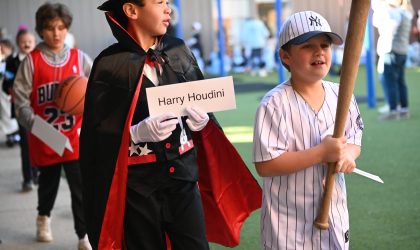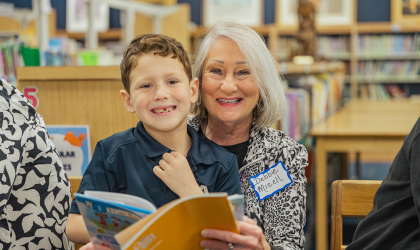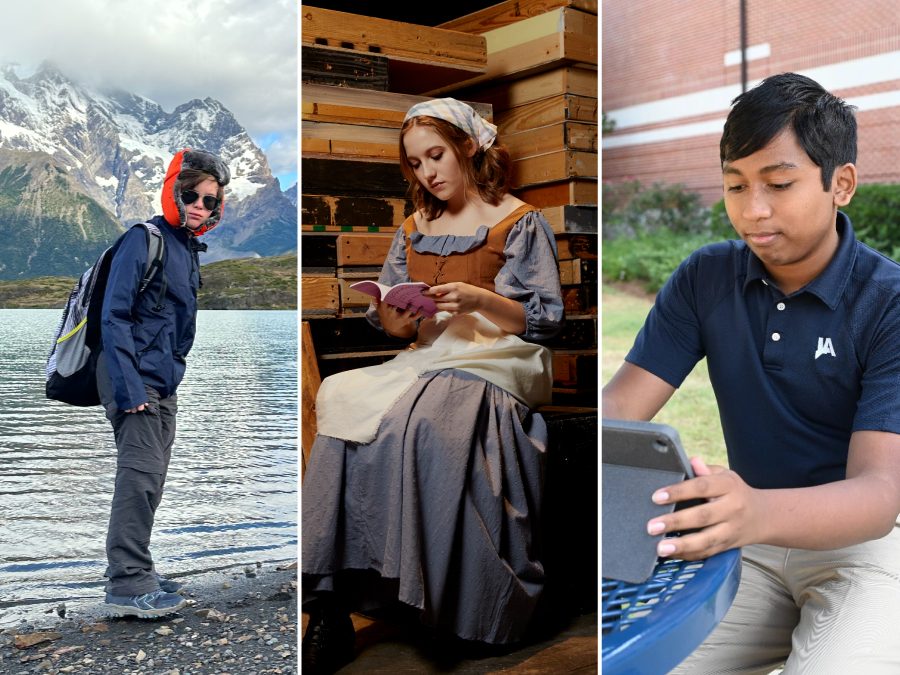

Unique summer experiences create lifelong memories. Just ask three Jackson Academy students who spent their break pursuing scientific interests, learning through traveling, or becoming a published illustrator.
AJ Duncombe
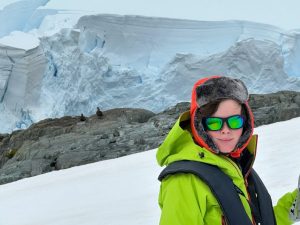
Seventh grader AJ Duncombe spent five weeks in London this summer, with a side trip to Paris. That may seem like a trip of a lifetime for a 12-year-old. But it’s only one of AJ’s travel stories.
AJ is a true explorer who had visited all seven continents before his twelfth birthday. Born in Richards Bay, South Africa, AJ has citizenship in both the U.S. and Australia due to his American mom and Australian dad. He went to six of the seven continents before age 3 and took his first 16-hour-long flight when he was just five months old.
“A couple of things I love about exploring and traveling are seeing the beauty of new countries and learning more about their history,” said AJ. “I enjoy going to visit landmarks, monuments, and museums.”
Last year, he took an Antarctica expedition, placing a check mark next to his final continent. “I have spent summers in South America and London and Christmas in Australia,” AJ explained. “But my favorite was in February 2023 when I took three weeks off of school and went to Patagonia and Antarctica.” Entrepreneur Dexter Dawson estimates fewer than 1 million people have been to all seven continents. Though Antarctica was spotted by early explorers, tourist trips to Antarctica began in the 1950s. In more recent years, Antarctic tourism is experiencing a rapid rise, according to “The Guardian” (click here to read online). IAATO tourism statistics note that many visitors do so by cruise ships or other vessels with fewer actually on foot. “Antarctica receives relatively few visitors compared to other destinations, but its unique qualities require rigorous safeguards,” the IAATO site explains (click here to read online).

AJ’s trip included gathering scientific data, seeing wildlife, and venturing into the frigid water. “In Patagonia, we went hiking in the mountains, saw a cave painting, and witnessed an avalanche. We then flew to Antarctica and got on a boat. We went around the South Shetland Islands and saw penguins, whales, orcas, and leopard seals. We even helped gather scientific data for an organization in Brazil studying plankton and how the loss of it impacts climate change. The coldest part of the trip was when I took the polar plunge! It was freezing. The expedition guides quickly pull you out of the water,” he said.
AJ’s travel experiences influence his academic perspective. “I’ve learned that the world is a big place with a lot of things to discover and learn,” he said. “When I go to college, I will probably major in whatever lets me travel, like world history or geography. The next place I would like to visit is Tokyo, Japan.”
The first student to email news@jacksonacademy.org with a list of the seven continents will receive two flex tickets to see the Mississippi Braves in Flowood. To read more about Antarctica, click here.
Sydney Thaxton
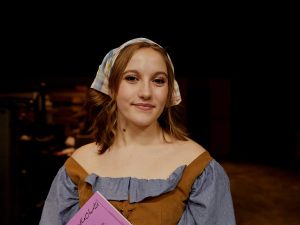
Senior Sydney Thaxton spent her summer in a creative pursuit that will further the understanding of attention deficit hyperactivity disorder (ADHD). She produced illustrations for a book by author and teacher Judy Turner.
“I spent my summer illustrating a children’s book as a service project alongside a lady from Caesar, Mississippi, who was a National Board Music Teacher for 35 years,” Sydney said. “She wrote a book about Rudy, the ADHD dog, to try to spread the message to children, parents, and grandparents that ADHD children go about tasks in different ways but end up doing such beautiful things along the way to their intended task.” In the fictional version of Rudy’s story, the pup ends up helping several fairytale characters while trying to feed the chickens.
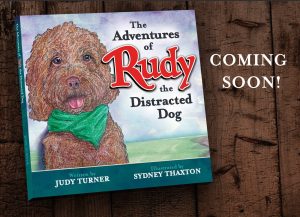
Rudy, an actual dog qualified to work with children, will accompany the author and illustrator on tour. “We are looking to get it published for the Christmas season and to do signings and visits to children’s hospitals to read,” Sydney said. “I produced 17 full illustrations using watercolor and colored pencils that I hope convey the whimsical nature of the book.”
Illustration is one of many of Sydney’s creative pursuits. She has appeared in numerous JA musicals and plays. Recently, she participated with her family in the production of a documentary on Walter Anderson, operating the camera on video shoots. Sydney also wrote and published a book about a pet dog when she was in Lower School.
Gautam Ray
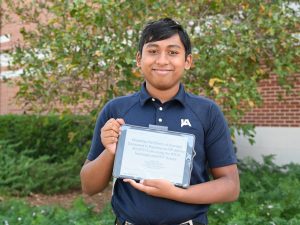
Senior Guatam Ray’s favorite part of his summer in Cambridge, Massachusetts, was meeting students from across the globe. He attended the summer Research Science Institute (RSI) at the Massachusetts Institute of Technology (MIT) from June 25 to August 5. The Center for Excellence in Education, alongside MIT, sponsored the program.
The 100 student scholars chosen worldwide for the program met well-known scientists, experienced college-level coursework, conducted individual research, created a scientific paper, and presented before scientific professionals and fellow students. Throughout the program, various lecturers, from Nobel Prize-winning physicist Dr. Wolfgang Ketterle to local professors, gave talks.
The RSI scholars, affectionately called the “Rickoids,” enjoyed food from around the world at international night, overnight camping during a Fourth of July event, and visiting Chinatown, the Freedom Trail, and other attractions of Boston. Sixty-eight of the 100 scholars were from the U.S., allowing Gautam to meet students from nearby states and international cities.
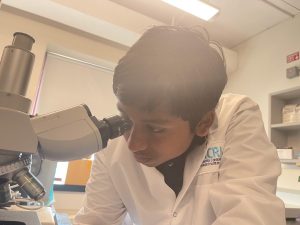
AP Biology and AP Chemistry classes at JA were among the factors that motivated him to complete the rigorous application process. “To get into the program, I submitted five essays, my PSAT, ACT, and AP Biology scores, three recommendations from two JA STEM teachers and my research instructor, my GPA, extracurriculars, awards, and further interests,” he said. “I applied to RSI due to my interest in biochemistry, which I plan to pursue in college, as I wanted to gain more research experience in the field.”
Read more about Gautam’s summer in this Q&A:
Please give us more specifics about your research and results.
My research involved the development of various anti-diabetic, combinational therapeutics and testing current therapeutics on neuroblastoma cancer cells to determine neurite outgrowth using techniques such as the RTCA technique and MTT Assays. The RTCA technique analyzes cells in real time, and MTT Assays are used to study cellular metabolic activity. I also imaged cells and used the Imagej application to determine neurite outgrowth, or the outward growth in each cell, to determine how cells grew in reaction to the various anti-diabetic therapeutics.
Tell us about learning to use Latex, a coding program scientists use to write papers using the language.
Latex, a document preparation system, uses a specific coding language to write papers, rather than traditional document preparation apps like Apple Pages or Microsoft Word, which allow users to type their final product directly. Latex’s main benefits revolve around its efficiency regarding formatting and professionalism compared to the latter two platforms, as Latex automatically professionally formats your paper. Similarly, Latex allows users to type complex equations involving functions that are typically harder to display on traditional document preparation platforms. The language is now customary in writing in various STEM fields at MIT and other universities.
How did you feel about presenting your research to a group of scientific professionals and other students?
Allowing professionals and my peers to give me feedback and questions regarding my project allowed me to develop my paper and presentation further while giving me practice in future presentations, whether in a high school classroom at JA or my future university.
How will the feedback you received help you at JA or in other endeavors?
Most of the feedback about my presentation delved into questions regarding the therapeutics I used and the motivations behind my experiment, alongside questions about the different techniques, such as the RTCA technique. This feedback will prepare me for possible questions in later presentations as I will continue to research in similar fields involving biology and biochemistry.
What was it like to hear presentations from and meet well-known scientists?
I met various professionals in the STEM field, such as an inventor of the gene-editing mechanism CRISPR, an employee of the financial service company Citadel, and a nobel laureate. Most of these professionals were alumni of RSI as well, so hearing about their future work after RSI allowed me to gain insight into how RSI alumni transition and grow over time. Moreover, hearing from STEM professionals, in general, increased my knowledge of STEM fields and sparked my curiosity for future research.
What did you enjoy about meeting other students and individuals worldwide?
While I enjoyed all aspects of the program, from my cell research to the professional lectures, my favorite part was meeting other students from around the world, many of whom became and remain my close friends. I was able to meet people from as close by as Florida and Texas to as far away as Spain and Singapore, and I mainly enjoyed learning about these student’s research and culture, as some students shared similar identities as me while others had vastly different experiences that I was fascinated to know about. Likewise, trying foods from different cultures with students from the culture of the food I was trying out was enthralling, as I got to learn more about my friends’ heritages.
What were your biggest takeaways from an experience like this?
After the program, I confirmed that I wanted my career to be in a STEM field. Additionally, my experience living in a college allowed me to be excited for my next four years, as living in a dorm with other individuals similar to me was an amazing experience, and being able to access libraries and lectures filled with STEM knowledge further sparked my curiosity in the fields. Finally, I loved living in a city this summer, so I hope to live in a city during college or sometime in my young adult life.
What would you say to other students who want to challenge themselves through a summer experience?
I encourage any student to challenge themselves through a summer experience they would like, whether it be a program like RSI or a summer job. RSI made this last summer one of the best summers of my life, so any student who would like to challenge themselves should go through their plan, as I learned a lot about where I would like to go to college and how college is during RSI.
